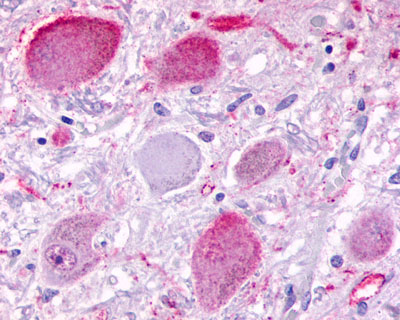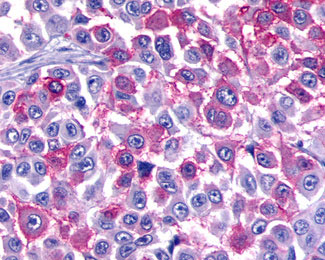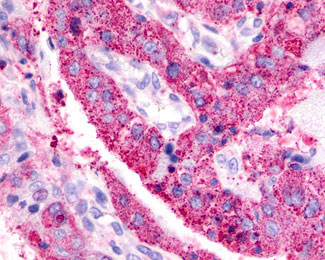ADGRB3 Antibody (C-Terminus)
Rabbit Polyclonal Antibody
- SPECIFICATION
- CITATIONS
- PROTOCOLS
- BACKGROUND

Application
| IHC-P |
|---|---|
| Primary Accession | O60242 |
| Reactivity | Human, Mouse, Rabbit, Monkey, Chicken, Horse, Bovine, Dog |
| Host | Rabbit |
| Clonality | Polyclonal |
| Calculated MW | 172kDa |
| Dilution | IHC-P (4 µg/ml) |
| Gene ID | 577 |
|---|---|
| Other Names | Brain-specific angiogenesis inhibitor 3, BAI3, KIAA0550 |
| Target/Specificity | Human BAI3. BLAST analysis of the peptide immunogen showed no homology with other human proteins. |
| Reconstitution & Storage | Long term: -70°C; Short term: +4°C |
| Precautions | ADGRB3 Antibody (C-Terminus) is for research use only and not for use in diagnostic or therapeutic procedures. |
| Name | ADGRB3 (HGNC:945) |
|---|---|
| Synonyms | BAI3, KIAA0550 |
| Function | Receptor that plays a role in the regulation of synaptogenesis and dendritic spine formation at least partly via interaction with ELMO1 and RAC1 activity (By similarity). Promotes myoblast fusion through ELMO/DOCK1 (PubMed:24567399). |
| Cellular Location | Cell membrane; Multi-pass membrane protein |
| Tissue Location | Strongly expressed in brain. Also detected in heart. Reduced expression in some glioblastoma cell lines |
| Volume | 50 µl |

Thousands of laboratories across the world have published research that depended on the performance of antibodies from Abcepta to advance their research. Check out links to articles that cite our products in major peer-reviewed journals, organized by research category.
info@abcepta.com, and receive a free "I Love Antibodies" mug.
Provided below are standard protocols that you may find useful for product applications.
Background
May regulate the number of excitatory synapses that are formed on hippocampus neurons. Has no effect on inhibitory synapses. Might be involved in angiogenesis inhibition and suppression of glioblastoma.
References
Shiratsuchi T.,et al.Cytogenet. Cell Genet. 79:103-108(1997).
Nagase T.,et al.DNA Res. 5:31-39(1998).
Nakajima D.,et al.DNA Res. 9:99-106(2002).
Ota T.,et al.Nat. Genet. 36:40-45(2004).
Mungall A.J.,et al.Nature 425:805-811(2003).
If you have used an Abcepta product and would like to share how it has performed, please click on the "Submit Review" button and provide the requested information. Our staff will examine and post your review and contact you if needed.
If you have any additional inquiries please email technical services at tech@abcepta.com.













 Foundational characteristics of cancer include proliferation, angiogenesis, migration, evasion of apoptosis, and cellular immortality. Find key markers for these cellular processes and antibodies to detect them.
Foundational characteristics of cancer include proliferation, angiogenesis, migration, evasion of apoptosis, and cellular immortality. Find key markers for these cellular processes and antibodies to detect them. The SUMOplot™ Analysis Program predicts and scores sumoylation sites in your protein. SUMOylation is a post-translational modification involved in various cellular processes, such as nuclear-cytosolic transport, transcriptional regulation, apoptosis, protein stability, response to stress, and progression through the cell cycle.
The SUMOplot™ Analysis Program predicts and scores sumoylation sites in your protein. SUMOylation is a post-translational modification involved in various cellular processes, such as nuclear-cytosolic transport, transcriptional regulation, apoptosis, protein stability, response to stress, and progression through the cell cycle. The Autophagy Receptor Motif Plotter predicts and scores autophagy receptor binding sites in your protein. Identifying proteins connected to this pathway is critical to understanding the role of autophagy in physiological as well as pathological processes such as development, differentiation, neurodegenerative diseases, stress, infection, and cancer.
The Autophagy Receptor Motif Plotter predicts and scores autophagy receptor binding sites in your protein. Identifying proteins connected to this pathway is critical to understanding the role of autophagy in physiological as well as pathological processes such as development, differentiation, neurodegenerative diseases, stress, infection, and cancer.




